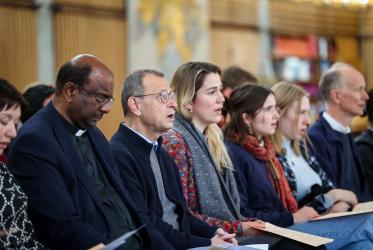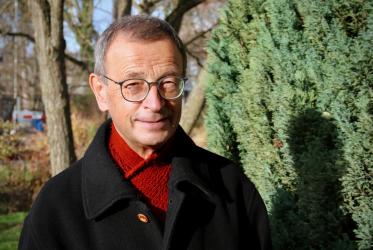Attacks last week on French newspaper Charlie Hebdo, along with attacks on Paris police and shoppers at a Jewish grocery there, triggered vigorous reflections on freedom of expression, religious values and the role of churches in a World Council of Churches (WCC) Communications Forum.
The forum was held on 12 January in the Ecumenical Centre, Geneva, Switzerland. Among the speakers were WCC staff members, including Theodore Gill, Georges Lemopoulos, Rev. Dr Nyambura Njoroge, Michel Nseir, Peter Prove, Rev. Dr Peniel Rajkumar and Rev. Dr Hielke Wolters.
Participants unanimously condemned the violence. But they also evinced a diversity of opinions about freedom of expression in cases where it enflamed inter-religious tensions, demonized or stereotyped religious traditions, or conveyed fears of others.
Two participants discussed the WCC role in the legacy of human rights discourse, including the UN Universal Declaration of Human Rights in 1948, even as they acknowledged the often checkered history of Christianity in relation to violence.
Some contributors noted a double standard in nations’ application of freedom of expression, the misuse of laws that guard against “blasphemy,” and the role of churches in countering stereotypes of religious or ethnic minorities. “Freedom of expression can often reinforce hegemonies of the enlightenment,” said Peniel Rajkumar, programme executive for inter-religious dialogue and cooperation. Health and healing programme executive Nyambura Njoroge pointed to the massive attention given by media and the public to the Paris attacks, in contrast to the scant attention given to larger deadly attacks and atrocities by Boko Haram in Nigeria.
“Of course, it is easy to support freedom of expression when you agree with the speaker, or at least when you are not too offended,” said Theodore Gill, senior editor for WCC Publications. But he noted that it is much more difficult when one finds material disagreeable or offensive or prejudicial. Speakers disagreed on whether or how media needs to police itself to avoid stereotyping and provoking violence.
Although several speakers affirmed that doubting and questioning even the sacred spaces of religion are needed in a democracy, and are part of the right to freedom of expression, encouraging xenophobia, anti-Semitism and Islamophobia cannot be justified in the name of protecting Western democratic values.
The particular place of religion and secularism in French society and in Europe were also discussed.
The Paris attacks cost the lives of 20 people and were condemned by the WCC. Acting general secretary Georges Lemopoulos said, “The World Council of Churches utterly rejects and condemns any religious justification advanced for it. Together with all people of true faith and good will, we pray for the victims and their families, for the perpetrators to be brought to justice, for the extremist ideology that inspired this attack to be extinguished, and that justified outrage may not lead to reprisals against Muslims or fuel anti-Islamic sentiment.”
WCC condemns Paris slayings (WCC news release of 7 January 2015)





